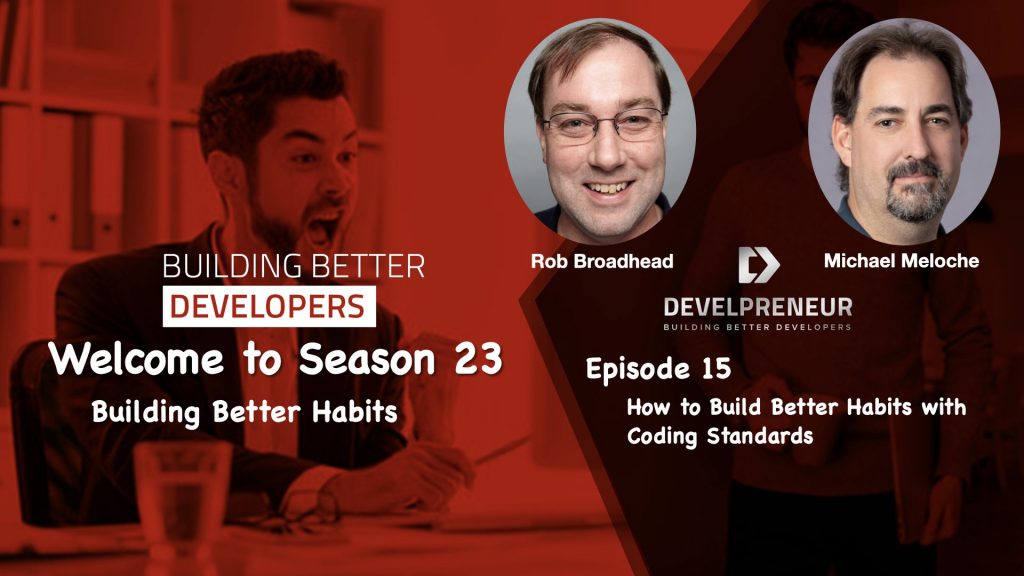Season after season, the “Building Better Developers” podcast inspires tech enthusiasts to refine their craft by fostering productive habits. In a recent episode, hosts Rob Broadhead and Michael Meloche emphasized coding standards—a crucial but often overlooked pillar in software development. Here’s a deep dive into their insights on how personal and team-wide coding standards can elevate your development game.
Why Coding Standards Matter
At its core, coding standards provide consistency and clarity. Whether you’re an independent developer or part of a large team, they serve as a guideline for writing clean, maintainable, and professional code. Rob pointed out that following standards is not about adhering to rigid rules but about making life easier—for yourself and your team.
Michael added a critical perspective: coding standards often extend beyond aesthetics. In industries like healthcare and finance, compliance with external standards like HIPAA or SOC is mandatory. Similarly, developers working on mobile apps must align with platform-specific requirements, such as those of the Apple App Store, to ensure their software is accepted and functions as intended.
Personalizing Coding Standards
The hosts encouraged listeners to start with personal coding standards before expanding to team-wide practices. Rob explained that simple habits, such as consistent indentation, intuitive variable naming, and clear function structuring, can dramatically improve readability and maintainability. He also highlighted tools like linters and formatters, which can automate the enforcement of these standards.
Michael expanded on this idea, emphasizing the concept of “clean code.” By writing self-documenting code—where functions, variables, and structures clearly convey their purpose—developers can minimize reliance on inline comments. However, he noted the importance of documenting elusive bugs or unique solutions directly in the codebase to prevent future troubleshooting headaches.
Leveraging Tools for Consistent Coding Standards
The episode underscored the importance of adopting tools like linters, such as SonarLint or integrated features in IDEs like Visual Studio Code. These tools can help enforce standards automatically, reducing the likelihood of human error. The hosts recommended configuring these tools for “format on save,” ensuring consistent styling across a team’s codebase.
Rob highlighted the productivity benefits of standardization, especially during code reviews and merges. Misaligned formats can create confusion, leading to unnecessary rework. By agreeing on a common setup and sharing IDE configurations, teams can streamline their development process and focus on meaningful changes.
The Broader Impact of Standards
Beyond the practicalities, coding standards contribute to a sense of professionalism and ownership. Rob likened them to a team’s “stamp,” reflecting their identity and ethos. For individual developers, adhering to consistent standards fosters discipline, an essential trait for long-term growth.
Michael introduced a compelling argument for balancing internal and external requirements. While personal and team standards are foundational, developers must also be mindful of external constraints, such as compliance and platform guidelines. This dual focus ensures that software not only functions well but also meets legal and industry expectations.
Challenges and Takeaways: Refining Your Coding Standards
The hosts concluded with a weekly challenge: dedicate 5–10 minutes daily to reviewing and refining your code according to your standards. This practice serves as a litmus test to assess whether you’re following your own rules. For teams without established standards, they recommended adopting widely respected guidelines, like Google’s or PEP 8 for Python, as a starting point.
Bonus tips included leveraging documentation exports and linter configurations to share consistent settings across teams. By doing so, developers can create an environment where everyone writes code that feels cohesive and professional.
Final Thoughts
Coding standards might not be the flashiest aspect of development, but they are undeniably impactful. By committing to personal and team-wide practices, you can improve not just your code but also your efficiency, collaboration, and career prospects. Whether you’re refining your Pomodoro technique or revisiting old projects, take a moment to reflect on your coding habits and how they align with your standards.
As Rob and Michael emphasized, “Building Better Developers” is about incremental progress. Coding standards are one small step toward becoming a more disciplined and effective developer. Start today, and see the difference it makes in your workflow and your team’s success.
Stay Connected: Join the Develpreneur Community
We invite you to join our community and share your coding journey with us. Whether you’re a seasoned developer or just starting, there’s always room to learn and grow together. Contact us at [email protected] with your questions, feedback, or suggestions for future episodes. Together, let’s continue exploring the exciting world of software development.

